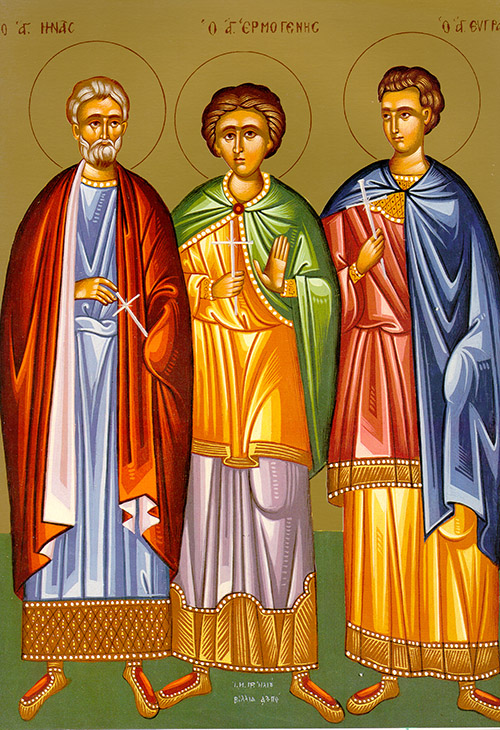

The holy martyrs Menas, Hermogenes, and Eugraphus: Menas and Hermogenes were born in Athens and moved to Constantinople in the 4th century. Both were pagans. Menas was sent by Emperor Maximian to calm the strife between pagans and Christians in Alexandria. While there, he became a Christian. The emperor sent Hermogenes to Alexandria to punish Menas. After a miracle that occurred during Menas’s trial, Hermogenes became a Christian. Then the emperor himself came to Egypt and put forth both men to harsh torture. Upon seeing their valor, Eugraphus, who was Menas’s secretary, denounced himself to the emperor. Maximian had them all beheaded.
Having mortified the fiery visions and movements of the passions by abstinence, the martyrs of Christ received grace to dispel the ailments of the infirm, and to live even after death to work wonders. O truly most glorious wonder, that naked bones pour forth healing. Glory to the One God and Creator.
Let us all honor with sweet singing Menas the wonderful, Hermogenes the divine, and Eugraphus dedicated together, for they honored the Lord and suffered honorably for Him, and are worthy to be numbered with the bodiless choir in heaven; and they are bountiful wonders.
Hebrews 9: 8-10; 15-23
Brothers and sisters: The Holy Spirit was showing thereby that while the first tabernacle was still standing, the way into the sanctuary had not yet been revealed. This is a symbol of the present time, in which gifts and sacrifices are offered that can never make perfect the conscience of the worshiper, but can only cleanse in matters of food and drink and various ritual washings: regulations concerning the flesh, imposed until the time of the new order.
This is why Christ is mediator of a new covenant: since his death has taken place for deliverance from transgressions committed under the first covenant, those who are called may receive the promised eternal inheritance. Where there is a testament, it is necessary that the death of the testator be confirmed. For a testament comes into force only in the case of death; it has no force while the testator is alive. Hence, not even the first covenant was inaugurated without blood. When Moses had read all the commandments of the law to the people, he took the blood of goats and calves, together with water and crimson wool and hyssop, and sprinkled the book and all the people, saying, “This is the blood of the covenant which God has enjoined upon you.” He also sprinkled the tabernacle and all the vessels of worship with blood. According to the law almost everything is purified by blood, and without the shedding of blood there is no forgiveness. It was necessary that the copies of the heavenly models be purified in this way, but the heavenly realities themselves called for better sacrifices.
Mark 8:22-26
At that time when Jesus arrived in Bethsaida, some people brought him a blind man and begged Jesus to touch him. Jesus took the blind man’s hand and led him outside the village. Putting spittle in the man’s eyes Jesus laid his hands on the man and asked, “Can you see anything?” The man opened his eyes and said, “I can see people but they look like walking trees!” Then a second time Jesus laid hands on the man’s eyes, and he saw perfectly; his sight was restored and he could see everything clearly. Jesus sent him home with the admonition, “Do not even go into the village.”
Icon courtesy of Jack Figel, Eastern Christian Publications – ecpubs.com
Monday, December 9 –